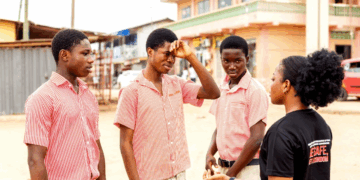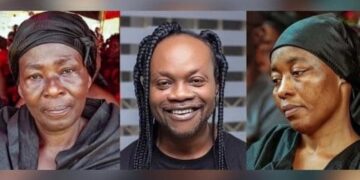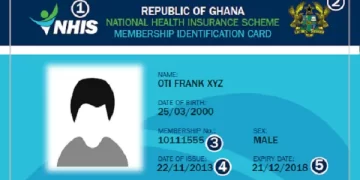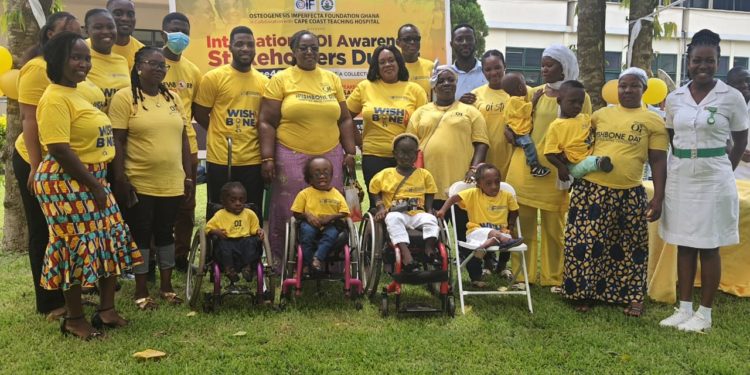Founder of the Osteogenesis Imperfecta foundation Ghana (OIF) , Mrs. Justina Yiadom- Boakye has urged the general public to discard the attitude of stigmatizing against person living with OI or any special condition.
According to her, such person are just like any person therefore they must be treated with utmost respect and dignity.
“OI is a big issue and people with such conditions are not animals, they are not trees, neither are they are gods. They are human beings like us created in a different way”, she emphasized.
She also believes through education people will be made aware about the condition and through that, people will eventually learn to accept people with the condition.
Mrs. Justina Yiadom- Boakye made this remark during a stakeholders’ durbar organized in collaboration with the Cape Coast Teaching Hospital (CCTH) in commemoration of the 2022 International Osteogenesis Imperfecta Awareness Day on Friday, May 6.
Osteogenesis Imperfecta (OI) also known as brittle bone disease is a rare condition and it is estimated that the number of people born with the condition is approximately 1 in every 15,000.
A child born with the condition may have soft bones that may break easily, bones that are not formed normally and other problems.
This year’s celebration was themed “One voice for OI”, and explaining the significance of the theme, founder of the OI foundation Ghana, Mrs. Justina Yiadom- Boakye stated that the theme sought to bring to light the need to accept OI people into the society and provide support to those with the condition.
She said “we are celebrating the wishbone day to create the atmosphere for people to know that yes, we have people with such a special condition and that we need people to know about it, to support and to give their well wishes to such people.”
Furthermore, Mrs. Yiadom- Boakye called for the reform of the country’s educational and healthcare system to offer special attention to people living with the OI condition.
She notes that the country’s educational and healthcare facilities do not favor people and that OI patients face a lot of challenges accessing such facilities, hence the need to formulate polices and structures to accommodate those with special needs.
“OI kids have short and weak limbs, especially with their hands and so if they are supposed to write 2 to 3 hours papers of exams, they can’t do it. Why not restructure our educational policies so that we can have more of oral examinations for these kids”, she emphasized.
On the issue about healthcare access for OI patients, she indicated that while her foundation in collaboration with CCTH has been able to establish an OI clinic to cater for people living with the condition, there is the need to integrate some of their medical expenses into the National Health Insurance Scheme in order to ease the burden on patients.
“ NHIS is not covering a lot of their medical needs and so we are pleading that there should look into it especially some of these specialized genetic conditions and incorporate some these expenses in the NHIS so that it can ease the burdens parents and care givers because it is not easy”, she pleaded.
“the kids also need therapy centers where they can go and exercise bones but we do not have them available and even if we have them at certain points, they have to travel miles to get access and it’s very expensive to have a child with OI so we need the support of government”, she added.
Read Also: UCC senior staff threaten strike over allowances, promotions
On his part, medical director of the CCTH, Dr. Stephen Laryea also added his voice to condemn the stigmatization against OI patients and stated that the condition is not infectious.
He said “we should not look down on them and as parents, let’s be careful of what we tell our children when they go to school. Let’s educate our children to accept these children and not to ostracize them.”
He further urged health-care providers to do their best in caring for the OI patients.
Also at the event, the Social Development Officer from the Central regional Department of social welfare and community development, Mr. Alexander Ofosu- Yeboah stated that OI patients are also persons with disabilities, hence he urged OI patients to visit his outfit in order to get the needed support.
Senior lecturer with the Boichemistry department in the University of Cape Coast, Dr. Mawuli Agbale also made a call to pharmaceutical companies in the country to devote more resources in developing more medications for the treatment of OI.



























